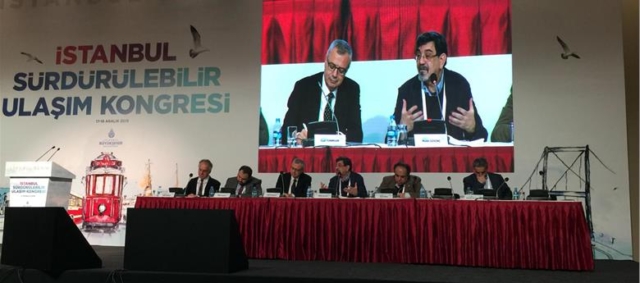The issue of “Urban Mobility in Smart Cities” was handled at the “Sustainable Transportation Congress” of IMM. In the session moderated by Prof. Dr. Haluk Gerçek, transportation analysis, smart transportation systems, urban mobility evaluation subjects were discussed.

İhsan Eroğlu from IETT, General Manager of İSBAK A.Ş. Esat Temimhan and Murat Güvenç from Kadir Has University participated in the session on “Urban Mobility in Smart Cities”. Prof. Dr. Hüseyin Tarık Şengül and Prof. Dr. Kaan Özbay joined the speakers in the panel section.
ISBAK is in the field of transportation
İSBAK A.Ş. General Manager Esat Temimhan stated that it is very important to be able to hold such meetings throughout Istanbul and said, “ISBAK was a company established to carry out the maintenance works of IMM. We continue this business today. However, ISBAK has transformed over the years. ISBAK has started to attach importance to R&D activities in this transformation process”.
Stating that ISBAK’s field of activity has expanded and diversified due to the traffic density of Istanbul, Temimhan said:
“It is very important to measure and observe the traffic in the field. With a system called ‘ATAK’ developed by us, we can manage intersections more beneficially in the field. We also carry out electronic audits with the system called ‘EDS’. We all see that in countries with good traffic, the audit is also successful. The systems that we produce and manage under many different titles work in the field. ”
“It is important to bring the mind and the city side by side”
Murat Güvenç from Kadir Has University pointed out that the word “Smart”, which corresponds to the concept of “Smart Cities” in English, contains a conscious description, “There are many different service areas in the city. In these areas, we can receive service through a physical or virtual network. Traditionally it could be effective if the problem was designed for peak loads. However, in the principles of this design, it became clear that it was necessary to focus on fair use rather than effective use of the service. The criterion of providing just and equal service to all has disappeared over time. The understanding of local service provision has changed around the world. This new system has developed and spread in a neo-liberal understanding all over the world.”
Stating that there is a transformation where cities are currently competing with each other and this period may not be easy, Güvenç emphasized that technologies developed in a local context between technological determinism and disruptive technology can be effective. Güvenç concluded his words by saying, “As a result, I think it is better to develop technologies that enable people in the city to have knowledge”.
7 millions of Daily Istanbul Card Activity
İhsan Eroğlu, Head of IETT Transportation Planning Department, stated that they made a good mobility analysis by working on the Istanbul Card data and continued his speech as follows:
“This is how we can obtain passenger data at times we call ‘peak hours, which is an important value for us. We can also see from these data that student usage has increased after the discount in the student subscription service. IETT has created a business intelligence platform with the data it has produced. In this way, it is possible to make many decisions healthier. To create the data correctly, it is possible to obtain a better result by taking the data of the vehicles used outside of IETT. We can make our decisions healthier with a simulation that we get from all the data.”
Another panelist, Prof. Dr. Hüseyin Tarık Şengül stated that local governments in Turkey could not monitor technologies closely enough and said, “Those who manage the city are trying to manage a dynamic and active structure. When we say ‘Smart Cities’, we make an extreme definition in such a structure. What kind of city model, what kind of city management do we see behind all this smart city model? In an increasingly complex world, we see smart cities as the projection of big states and big capital. There may not be an escape from today’s world of technology, but we must also have a certain perspective. An open-access technology is possible” he said.
Foreign guests also took part at the panel
Prof. Dr. Kaan Özbay from New York University gave information about the project he is in, named “C2SMART”. Expressing, these academic projects started to attract the attention of the sector, Özbay said that, a sectoral opening opportunity emerged and continued:
“We also care about making some scientific background statements instead of just accessing comments from some data. What we do can be a learning opportunity where data can be put together where there is a lot of data like Istanbul.”
Özbay said, “We also care about making some scientific background statements instead of just accessing comments from some data. What we do can be a learning opportunity where data can be put together in Istanbul since it contains there is a lot of data.”
